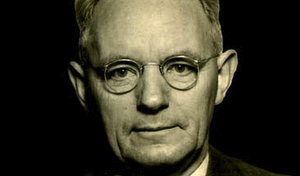Misinterpreting Brute Facts
Van Til is often [completely] misunderstood regarding his teaching on brute facts. For those unfamiliar with Van Til, a brute fact is one that is completely uninterpreted. It is a piece of “data” that exists “out there” and “on its own” without being interpreted by any mind whatsoever. Van Til gets the idea and the term from British absolute idealism and he clearly rejects the possibility of such a thing. But many readers misunderstand the reason for rejecting brute facts.
The postmodernist wants to reject the existence of brute facts by saying that all facts are interpreted by subjects who exist in a socio-cultural milieu. Therefore, we can never access “objective” truth because there are no brute facts. All our knowledge is colored by our socio-cultural situation. Van Til’s point in rejecting brute facts is not that human subjects are bound by culture and are therefore unable to interpret facts without bias, but that God is the all-knower. The self-sufficient Triune God knows all facts and pre-interprets them. Therefore we can never come to any fact without approaching it as one that is already known and has been interpreted by the all-knowing Triune God.
On page 101 of his book The Next Reformation: Why Evangelicals Must Embrace Postmodernity, Carl Raschke speaks of Van Til’s as a transitional theology on its way toward postmodernism. This is a terrible case of misreading a theologian – using a gross misrepresentation for one’s own doctrinal wiles. Our task as human knowers is to reinterpret the facts, thinking God’s thoughts after him on a created level. We think analogically as our knowledge is firmly planted on the one who knows all things. As such we are not hopelessly trapped within our socio-cultural context, but can escape that context because God has clearly revealed himself and that he is the reference point for all knowledge. Perhaps readers are interpreting Van Til according to their own postmodern inclinations.




Thinking God’s thoughts after Him, as Van Til so persuasively argues, actually destroys the stronghold of postmodernity, as well as every other deviant philosophy.
Unfortunately Raschke is not the only one to misread Van Til this way.
Speaking of misreading Van Til, Paul Helm over at his blog, Helm’s Deep, says that Van Til rejected natural theology. This is an odd thing for him to say. Odd for two reasons. Odd because it is not true and odd because Helm is a bright man and usually is right on the money.
Firstly, Van Til distinguishes between natural revelation and natural theology which is a distinction some fail to make. Natural revelation is God’s revelation of himself in creation and natural theology is man’s reflection on and response to natural revelation. Even the post-Reformation Reformed scholastics had a distinction between worthwhile natural theology and futile natural theology. Secondly, Van Til affirms a proper natural theology in his chapter “Nature and Scripture” in the Westminster faculty symposium “The Infallible Word.”
So let’s get Van Til correct, even if we do not agree with him.
Van Til was very clear about the kind of “natural theology” he was rejecting, namely, a Thomistic approach that undergirds a Roman Catholic system of autonomy and human reason. It is the subjective “oughtness” of the RC ethic, built on their form of Natural Theology, that Van Til is rejecting. There is no “natural theology” in that sense. But Van Til constantly affirmed the truth that the law of God was written on the heart of all men by nature, and that, by common grace, the natural man could get some things right in a metaphysical sense–even in the sphere of ethics.